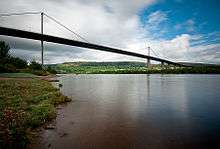Erskine Bridge Tolls Act 2001
|
| |
| Dates | |
|---|---|
| Royal assent | 13 September 2001 |
| Other legislation | |
| Replaces | UK Parliament Erskine Bridge Tolls Act 1968 |
| Repealed by | Abolition of Bridge Tolls (Scotland) Act 2008 |
| Text of the Erskine Bridge Tolls Act 2001 as in force today (including any amendments) within the United Kingdom, from legislation.gov.uk | |
The Erskine Bridge Tolls Act passed by the Scottish Parliament in 2001 is a piece of legislation to restore, with retrospective effect (other than as regards criminal liability), the power to levy tolls. This power was originally conferred by section 1(1) of the UK Parliament Erskine Bridge Tolls Act 1968.
The Problem
Toll charges on the Erskine Bridge were suspended in August 2001, after the Scottish Executive discovered it had been collecting money illegally for several weeks following a failure to extend the legislation which allowed designated officials to collect money for the crossing over the River Clyde near Glasgow.[1]
Passage through Parliament
A few weeks later, the Erskine Bridge Tolls Act 2001 asp 12 was passed by the Scottish Parliament by 78 votes to 26, with no abstentions. The Scottish National Party fought the Bill during its day-long passage through the Scottish Parliament, arguing that it was being rushed through without proper consultation.[2] Adam Ingram, the SNP transport spokesman, insisted that the use of emergency procedures meant the public and the local authorities, such as West Dumbartonsbire council and Renfrewshire, were being denied the right to object.[3] The bill was given the Royal Assent on 13 September 2001.
Subsequent Legislation
Following Phase II of the Scottish Executive's Tolled Bridges Review, the Act was effectively set aside by the formal ministerial suspension of tolls in 2006.[4] The remaining provisions of the 1968 Act were superseded by the Abolition of Bridge Tolls (Scotland) Act 2008 (asp 1).
See also
References
- ↑ "Tolls suspended on Scottish bridge". BBC News. 31 August 2001.
- ↑ "Bridge tolls reinstated 'in days'". BBC News. 6 September 2001.
- ↑ Erskine bridge tolls in fast lane, heraldscotland.com, 7 September 2001
- ↑ Tolls removed from Erskine Bridge BBC News, 1 April 2006
External links
- Text of the Erskine Bridge Tolls Act 2001 as in force today (including any amendments) within the United Kingdom, from legislation.gov.uk
- Text of the Erskine Bridge Tolls Act 2001 as in force today (including any amendments) within the United Kingdom, from legislation.gov.uk
- Tolled Bridges Review: Phase Two Report, The Scottish Government, 8 March 2006
.svg.png)
